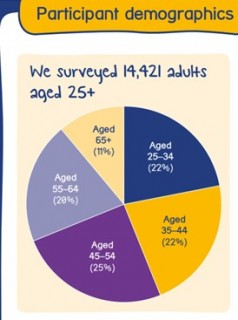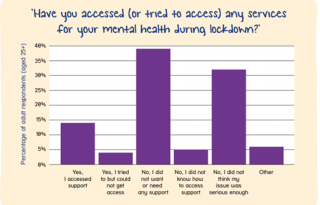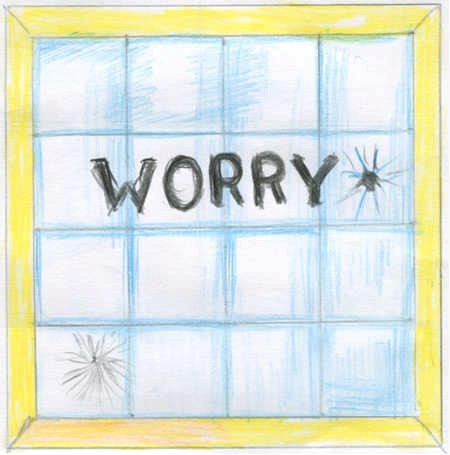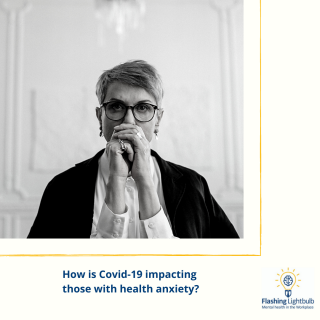How is Covid-19 impacting those with health anxiety?
"I've always struggled with my mental health. I've been getting better over the past few years, but I'm deteriorating so quickly right now." says one survey participant of the National Mind "mental health emergency" survey, June 2020.
We'll take a deeper dive into some points of the survey in this blog post.
The effects of social distancing, the lockdown, the loss of loved ones to the virus, and the over-consumption of stress-inducing media, may have lasting effects long after lockdown is over. 60% of adults said that their mental health has deteriorated during the period of lockdown restrictions, from early April to mid-May 2020. Not being able to see friends and family, go outside and anxiety about getting coronavirus were the main reasons people experienced poor mental health during the lockdown.
Social media can be a positive coping strategy but some also cited social media as a negative trigger for their mental health as it often contained a lot of frightening messages about COVID-19.
"I have spent the entire lockdown worrying about how I will function when this is over and that I will lose my job because I won't be able to do it. No one has provided any support for those worries and feelings." said one survey participant.
Some people are also experiencing anxiety around going back to their jobs, after working from home or not working for so long. They would like more guidance on how to deal with this transition back to work. HR managers may need to think about how to support staff's Mental Health on returning back to work after a long period of absence.
During the lockdown, many people did not access services because they felt that they didn't deserve support. A third of adults did not seek mental health support during the lockdown as they did not think that their issue was serious enough.
"I thought my issue was too trivial and selfish given the current situation." said a survey participant.
The top five most popular sources of information and advice for adults the survey revealed were: Friends and family, Official government guidance, Social media, Charities, and the TV.
The survey also revealed that adults with poor mental health are less likely to have gone to family and friends for advice about their mental health, having a source of information available when staff return to work will be vital for the long term mental health of employees returning to work.
Bethany Smith is a freelance writer from Hull, UK Bethany says "It was not until the Prime Minister's speech on 12th March that it hit me. Panic set in. I felt that same familiar feeling. A tight chest, overwhelming emotions, a barrage of intrusive, catastrophising thoughts. I cannot assure myself that I won't get sick, because I might. I cannot remind myself how advanced our healthcare system is, because the NHS may struggle. I cannot go out and keep busy because we must practice social distancing."
She was not alone in these emotions with many people stating similar views. For those need immediate help Anxiety UK offers its Helpline: 03444 775 774 Mon-Fri 9.30am-7.30pm
Those who are struggling with a Health anxiety condition, feel anxious in spite of repeated reassurance from their GP that they are not suffering from a serious disease. Just thinking about their health causes great distress and interferes with work, family, and social life.
Many have a compelling urge to repeatedly check symptoms on the Internet, examine themselves, or ask family for reassurance. For those who are struggling with anxiety, one proven coping strategy is the worry window tool..
THE WORRY WINDOW: Listen, your worry is not your boss, partner, or your parent. You don't have to drop everything when it calls. In fact, the worry can damn well wait until you are ready. Really?
Yes, really. In this technique, you give yourself permission to worry, but you make time to do it later. The point is: postponing worry works.
Yes, it's a worry Stop and Notice that you're worrying. If there is nothing you can do right now to resolve the issue you're worried about, then your worrying can be postponed.
Set a worry time. This works best if you set aside a specific time to worry instead of simply thinking 'I'll worry about it later'.
Embrace a worry-free now. Give yourself permission to postpone your worrying, in the knowledge that you'll come to it later.
Worry at the set time (or maybe not). When it comes to the assigned time, allow yourself to worry for a set amount of time, and then move on to a different activity. If your worrying feels incomplete, schedule a further time to continue worrying.
If you would like to discuss supporting your staff as they return to work or with issues arising from the COVID-19 lockdown, please look through what services we can offer here and get in touch to chat about your needs through our contact page
Comments
By accepting you will be accessing a service provided by a third-party external to https://www.flashinglightbulb.co.uk/






